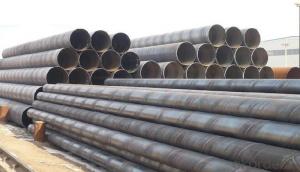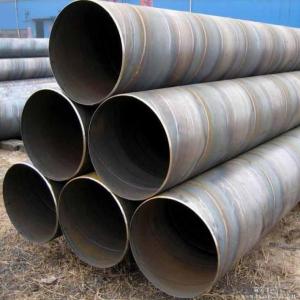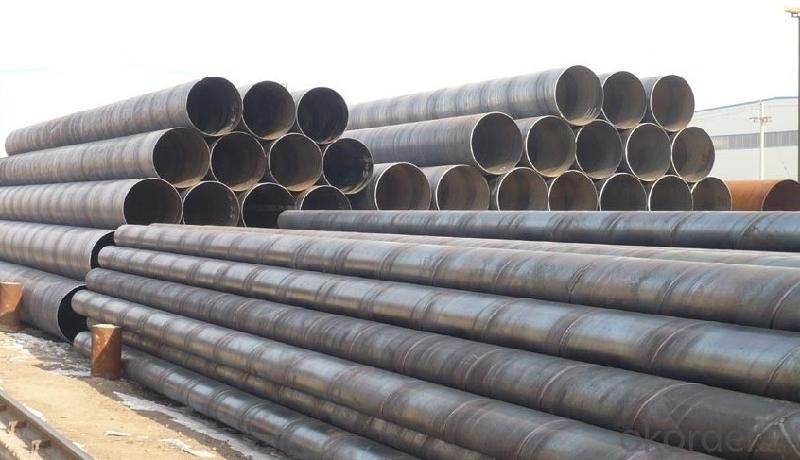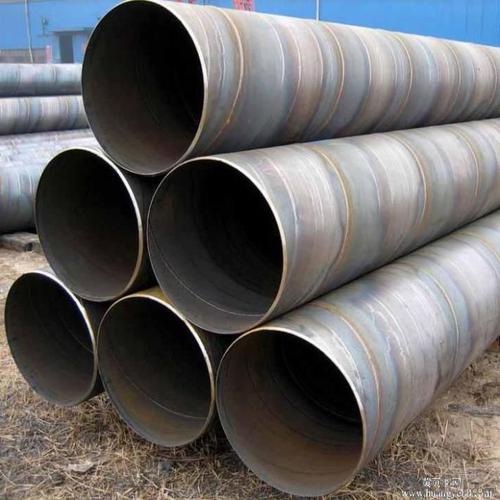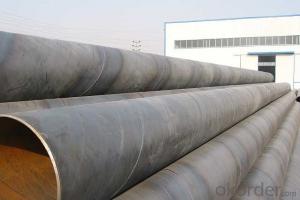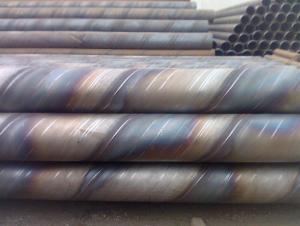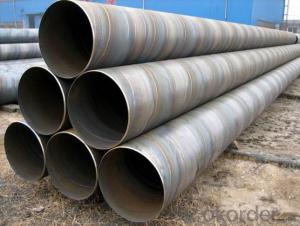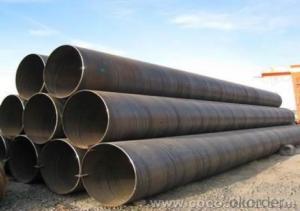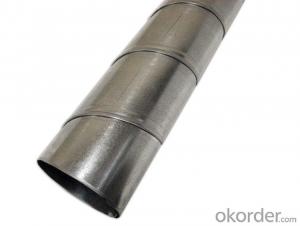SPIRAL STEEL PIPE 42’‘ ASTM API LARGE DIAMETER PIPE
- Loading Port:
- Tianjin
- Payment Terms:
- TT OR LC
- Min Order Qty:
- 5 m.t.
- Supply Capability:
- 3000 m.t./month
OKorder Service Pledge
OKorder Financial Service
You Might Also Like
Packaging & Delivery
Packaging Detail: | standard export packing or as customer's requirement |
Delivery Detail: | within 10 - 30 days |
Specifications
Spiral Welded Steel Pipes and Tubes
1.Material:Q195-Q235
2.Length:1-12m
3.WT:1.0-14mm
4.O.D.:20-273mm
Spiral Welded Steel Pipes and Tubes
Product Description:
1.Material : Q235,Q345,L245,L290,L360,L415,L450,L485,GrB,X42,46,X52,X56,X60,X65,X70,X80,X100
2,Standard: SY/T5037-2000,GB/T9711-2011,API Spec 5L PSL1/PSL2,ASTM A252\A53,ISO3183,DIN17172,EN10217,JIS G3457,AWWA C200,ASTM A139,ASTM A671,ASTM A672
3.Wall thickness: 3.0mm-30mm
4.Outer diameter: φ168mm-3020mm
5,Length: 5m-12m or as your requirement
6,Corrosion protection standard: DIN30670,DIN30671, AWWAC210, AWWA C203, SY/T0413-2002,SY/T0414-2002
7,Application: Oil, gas, natural gas, water pipe, thermal electricity pipe, steel structure engineering, etc
Q195-q345 Material Steel Pipe's Materials
Elements | Chemical Compsition% | Mechanical Property | ||||||
C% | Mn% | S% | P% | Si% | Yield Point (Mpa) | Tensile Strength(Mpa) | Elongation | |
Q195 | 0.06-0.12 | 0.25-0.50 | <0.050< span=""> | <0.045< span=""> | <0.030< span=""> | >195 | 315-430 | 32-33 |
Q215 | 0.09-0.15 | 0.25-0.55 | <0.05< span=""> | <0.045< span=""> | <0.030< span=""> | >215 | 335-450 | 26-31 |
Q235 | 0.12-0.20 | 0.30-0.70 | <0.045< span=""> | <0.045< span=""> | <0.030< span=""> | >235 | 375-500 | 24-26 |
Q345 | <0.20< span=""> | 1.0-1.6 | <0.040< span=""> | <0.040< span=""> | <0.55< span=""> | >345 | 470-630 | 21-22 |
- Q: How are steel pipes used in airport infrastructure?
- Steel pipes are used in airport infrastructure for a variety of applications such as constructing hangars, fuel distribution systems, water supply networks, and underground utility lines. They provide structural support, durability, and resistance to extreme weather conditions, making them essential for the smooth functioning and long-term reliability of airport facilities.
- Q: What are the common methods of joining steel pipes?
- The common methods of joining steel pipes include welding, threading, and using mechanical couplings. Welding involves fusing the pipes together using heat, while threading involves screwing the pipes together using threads on the ends. Mechanical couplings are devices that connect the pipes together using compression or other means.
- Q: What is the cost of steel pipes compared to other pipe materials?
- The cost of steel pipes can differ from other pipe materials depending on various factors, such as size, grade, and availability. However, steel pipes typically offer more cost-effectiveness compared to alternative materials. This is due to the widespread availability and versatility of steel, which allows for easy manufacturing and fabrication into different pipe sizes and shapes. When compared to materials like copper, stainless steel, or plastic, steel pipes are often more affordable due to their lower manufacturing costs. Furthermore, steel pipes have a longer lifespan and superior durability, making them a cost-effective choice in the long term. They exhibit resistance to corrosion, can withstand high pressure and temperature, and find applications in plumbing, construction, and infrastructure projects. It is worth mentioning that the cost of steel pipes can still fluctuate based on market conditions, demand, and location. Nevertheless, overall, steel pipes are generally considered a cost-effective option when compared to other pipe materials.
- Q: How are steel pipes used in the construction of gas distribution networks?
- Steel pipes are commonly used in the construction of gas distribution networks due to their durability, strength, and ability to withstand high pressure. These pipes are used to transport natural gas from the source to homes, businesses, and industries. The steel pipes are laid underground and connected using fittings and valves to create a network that efficiently distributes gas. It ensures a safe and reliable delivery of gas to consumers while minimizing the risk of leaks or accidents.
- Q: What are the common methods for repairing steel pipes?
- Some common methods for repairing steel pipes include welding, pipe wrapping, pipe relining, and pipe bursting.
- Q: How are steel pipes coated to prevent external corrosion?
- Steel pipes are coated to prevent external corrosion through a process called external coating. This typically involves applying a layer of protective material, such as epoxy or polyethylene, onto the surface of the steel pipe. The coating acts as a barrier, preventing moisture and other corrosive substances from coming into contact with the steel. This helps to prolong the life of the pipe and maintain its structural integrity.
- Q: Can steel pipes be used for culvert applications?
- Yes, steel pipes can be used for culvert applications. Steel pipes are commonly used for culverts due to their strength, durability, and resistance to corrosion. They are capable of handling heavy loads and can withstand harsh environmental conditions, making them suitable for various culvert applications such as road and railway crossings, drainage systems, and stormwater management.
- Q: Can steel pipes be used for irrigation pumps?
- Yes, steel pipes can be used for irrigation pumps. Steel pipes are commonly used in irrigation systems due to their durability, strength, and resistance to corrosion. They can efficiently transport water from the pump to the irrigation fields, ensuring a reliable and long-lasting solution for irrigation needs.
- Q: Can steel pipes be used for underground water wells?
- Yes, steel pipes can be used for underground water wells. Steel pipes are commonly used for drilling water wells due to their durability, strength, and resistance to corrosion. However, it is important to ensure that the steel pipes are properly coated and protected to prevent any contamination of the underground water source.
- Q: What are the different types of coatings used on steel pipes?
- There are several different types of coatings used on steel pipes, including polyethylene, fusion bonded epoxy, coal tar enamel, and asphalt enamel. These coatings provide protection against corrosion, abrasion, and other forms of damage, ensuring the longevity and durability of the steel pipes.
Send your message to us
SPIRAL STEEL PIPE 42’‘ ASTM API LARGE DIAMETER PIPE
- Loading Port:
- Tianjin
- Payment Terms:
- TT OR LC
- Min Order Qty:
- 5 m.t.
- Supply Capability:
- 3000 m.t./month
OKorder Service Pledge
OKorder Financial Service
Similar products
Hot products
Hot Searches
Related keywords
